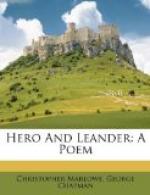|
This section contains 6,206 words (approx. 21 pages at 300 words per page) |

|
SOURCE: Haber, Judith. “‘True-loves Blood’: Narrative and Desire in Hero and Leander.” English Literary Renaissance 28, no. 3 (autumn 1998): 372-86.
In the following essay, Haber offers a stylistic analysis of Marlowe's treatment of desire in Hero and Leander, contending that the poem “refuses the comforts of a conventional, mastering narrative.”
Most critics would agree that throughout Christopher Marlowe's corpus there exists a tension between orthodox and heterodox modes of thought, between containment and resistance. This tension is frequently figured within the texts themselves as a dialectic between the assertion of a phallic point and an acknowledgment of complete pointlessness. In Edward II, for example, Marlowe repeatedly evokes—and links—pointlessness in all its senses: impotence, lack, non-meaning, indeterminacy, incompleteness; yet the threat posed by these ideas is effectively contained when both Edward and the audience get the point in the end.1 In Hero and Leander, Marlowe is able more fully...
|
This section contains 6,206 words (approx. 21 pages at 300 words per page) |

|


